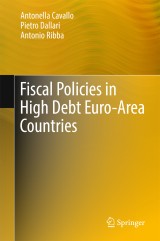Details

Fiscal Policies in High Debt Euro-Area Countries
|
106,99 € |
|
| Verlag: | Springer |
| Format: | |
| Veröffentl.: | 15.11.2017 |
| ISBN/EAN: | 9783319702698 |
| Sprache: | englisch |
Dieses eBook enthält ein Wasserzeichen.
Beschreibungen
This book explores the role of national fiscal policies in a selected group of Euro-area countries under the European Economic and Monetary Union (EMU). In particular, the authors characterize the response of output to fiscal consolidations and expansions in the small Euro-area open economies affected by high public and private debt. It is shown that the macroeconomic outcome of fiscal shocks is strongly related to debt levels. The Euro-area countries included in the investigation are Greece, Ireland, Italy, the Netherlands, Spain, and Portugal, over the sample period 1999–2016, i.e., the EMU period. The main econometric tools used in this research are structural vector autoregressive (VAR) models, including panel VAR models. The available literature relating to the subject is also fully reviewed. A further closely investigated topic is the potential spillover effects of German fiscal policies on the selected small Euro-area economies. Moreover, in the perspective of the evolution of the Euro Area towards a full Monetary and Fiscal Union, the authors study the effects of area-wide government spending shocks on aggregate output and other macroeconomic variables during the EMU period. The closing chapter of the book considers evidence on the consequences of austerity policies for European labour markets during recent years.
1 Introduction.- 2 The Common Framework for National Fiscal Policies and the Euro<div>Area Fiscal Union.- 3 The Macroeconomic Effects of Fiscal Policy Shocks: A Review of</div><div>the Literature.- 4 The Macroeconomic Effects of Fiscal Shocks in High Debt Euro</div><div>Area Countries.- 5 A Further Look To Macroeconomic Outcomes of Fiscal Austerity</div><div>in High Debt Countries.- 6 Can (And Should) Germany Do It? Spillovers of German Fiscal</div><div>Policies in the Euro Area.- 7 The labor market outcomes of austerity. Evidence for Europe.</div>
<p><b>Antonella Cavallo </b>is a PhD Candidate in Labour, Development, and Innovation at the Marco Biagi Foundation of the University of Modena and Reggio Emilia and a member of the Research Center for Public Policy Analysis. She received her MA in Economics and Public Policy, summa cum laude, at the University of Modena and Reggio Emilia. Her research interests include monetary economics and macroeconomics.<br/></p><p><b>Pietro Dallari</b> is an economist in the Fiscal Affairs Department of the International Monetary Fund, Washington (USA). His research interests include business cycles, fiscal policy, and finance. He holds a PhD in Economics from Pompeu Fabra University, Barcelona (Spain).<b><br/></b></p><b>Antonio Ribba</b> is an Associate Professor in the Department of Economics “Marco Biagi”, University of Modena and Reggio Emilia (Italy). He received his PhD from the University of Bologna (Italy) in 1996. His research interests include applied macroeconomics, business cycle fluctuations, and monetary and fiscal policy.
This book explores the role of national fiscal policies in a selected group of Euro-area countries under the European Economic and Monetary Union (EMU). In particular, the authors characterize the response of output to fiscal consolidations and expansions in the small Euro-area open economies affected by high public and private debt. It is shown that the macroeconomic outcome of fiscal shocks is strongly related to debt levels. The Euro-area countries included in the investigation are Greece, Ireland, Italy, the Netherlands, Spain, and Portugal, over the sample period 1999–2016, i.e., the EMU period. The main econometric tools used in this research are structural vector autoregressive (VAR) models, including panel VAR models. The available literature relating to the subject is also fully reviewed. A further closely investigated topic is the potential spillover effects of German fiscal policies on the selected small Euro-area economies. Moreover, in the perspective of the evolution of the Euro Area towards a full Monetary and Fiscal Union, the authors study the effects of area-wide government spending shocks on aggregate output and other macroeconomic variables during the EMU period. The closing chapter of the book considers evidence on the consequences of austerity policies for European labour markets during recent years.
Investigates the role of fiscal policies in a wide group of Euro-area economies, employing a unified methodological approach Offers new insights into the role played by private, as well as public, debt in shaping the macroeconomic outcomes of fiscal policies in open economies Estimates the effects of German fiscal shocks on aggregate output in the other Euro-area countries Includes supplementary material: sn.pub/extras

















